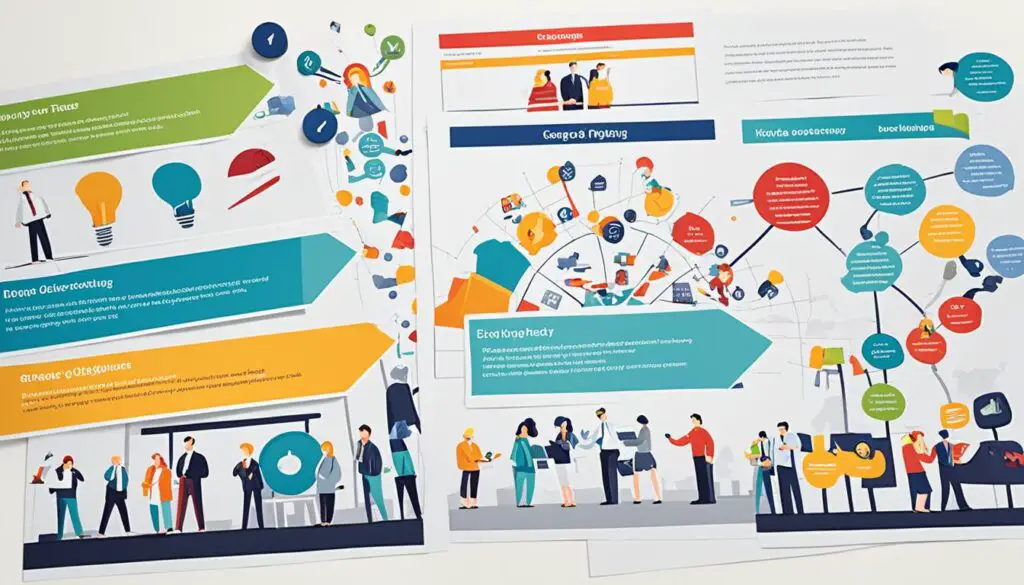Role-playing activities make learning the Bible fun and interactive. By acting out real situations, students learn vital skills. These include negotiation, teamwork, and cooperation. This way, students can explore their feelings in a safe environment.
This approach allows students to be someone else in fun scenarios. They get to be like a character from the Bible. It makes learning more hands-on and interesting. Through role plays, Bible stories come alive in a personal way.
Role plays also help in solving problems and thinking critically. Students put what they know to use in practical ways. They tackle the challenges of those different from them through role play.
Moreover, role plays help students understand others better. By watching their peers play out roles, they learn to see from various perspectives. This builds empathy and a better awareness of social issues.

Key Takeaways:
- Role playing activities engage students and bring Bible teachings to life.
- Students assume different roles and act out real-life situations, developing important skills such as negotiation, teamwork, and cooperation.
- Role playing exercises provide real-world scenarios for learning and promote critical observation of peers.
- Role plays motivate students, enhance teaching strategies, and create a dynamic learning environment.
- By incorporating role play into lessons, educators can enrich the spiritual journey of their students.
Benefits of Role Playing in the Classroom
Role playing brings many pluses for students and teachers alike. It makes learning fun and interactive. This approach also helps students see how lessons apply to the real world.
Role playing makes students eager to learn. They dive into various roles and situations. This active learning method boosts their interest, sharpens their thinking, and helps them grasp subjects more deeply.
Role playing also hones skills for daily life. In these activities, students practice negotiation, teamwork, and cooperation. These are key for communicating well and working together in jobs later on.
There’s a chance for students to learn from their peers too. Watching others can teach new strategies and approaches. This helps students improve their problem-solving skills.
To sum up, role playing is an amazing teaching tool. It boosts interest, teaches important skills, and makes learning fun. By using role playing, teachers can help students grow, work better together, and face future challenges head-on.

Guidelines for Developing Role Playing Exercises
To make role playing exercises work well, I have certain rules. These guidelines focus on how to teach and check students. They help make activities that are both fun and useful for learning.
1. Introduce Small, Non-Graded Role Plays Early On
Start with simple, extra exercises that aren’t graded. This makes students more at ease with role playing and gets them to see why it’s important. These easy tasks prepare them for harder tasks later. It helps students get comfortable and learn the needed skills step by step.
2. Tie Role Plays to Learning Objectives
It’s key that every role play fits with what we need to learn. This makes sure every activity has a clear goal that matters to the lessons. Students can see why role playing is important for their education.
3. Clearly Define Assessments and Provide Feedback
Role playing activities must have clear ways to judge student work. This could be by how well they do as actors, or by what they say about the acting. When we give good feedback, students find out their good points and where they need to work harder. This helps them keep improving.
4. Set Guidelines for Content and Behavior Expectations
It’s important to lay out rules for what’s in the plays and how students act during them. These guidelines make sure everyone knows how to behave and talk in a respectful way. They help make a safe, learning place where students can try new ideas and learn useful social skills.
5. Challenge All Students Equally
When giving out parts for the plays, it’s vital that everyone has a fair shot. I pick roles in a way that pushes every student to get involved and work hard. This way, everyone feels they got a fair chance and it encourages teamwork.
Using these rules improves how well role playing exercises work. It makes learning more fun and interactive than just the usual lessons. By choosing the right ways to teach and test, I help my students learn deeply in ways they enjoy.

Conclusion
Role playing is a great way to make learning fun and real. It lets students act out lessons from the Bible. They learn by doing and thinking about different points of view. This makes learning more interesting and meaningful.
Getting students involved in lessons is key, and role playing does this well. It lets them use what they know in a practical way. This makes the learning stick and helps them see the big picture. They also get to try on different roles, which builds understanding and respect for others.
Role playing also helps students learn important life skills. Like talking well, solving problems, and working with others. These are skills they’ll need later in life, both personally and professionally. Plus, it boosts their self-confidence and ability to think on their feet.
To sum up, role plays make learning more exciting and hands-on. They let students dive deep into topics and learn by doing. Teachers see better engagement and more fun in the classroom. By using role playing, everyone wins – the students, the teachers, and the learning process.
FAQ
What are role playing activities?
Role playing activities help students learn by acting out real-life situations. This approach makes Bible teachings more practical. It helps students connect with the material, understand their emotions, and learn skills like negotiation and teamwork.
How can role playing benefit the classroom?
Role playing makes learning fun and interactive. It uses real-world situations to show the course’s importance. Students not only learn from teachers but also from each other by observing and giving feedback. This method boosts skills like teamwork and negotiation.
What guidelines should be considered when developing role playing exercises?
Several key points should be thought of when making these exercises. Start with small exercises to prepare for bigger ones. Each role play should link to what students need to learn. Clear goals and feedback are a must. Also, everyone should have fair challenges in the roles they get.
How do role playing activities enrich the spiritual journey of students?
Role playing makes learning about the Bible more vivid. It engages students in deep thinking and self-reflection. This approach makes learning exciting and meaningful. Teachers use it to make students’ spiritual journeys richer and more interactive.








